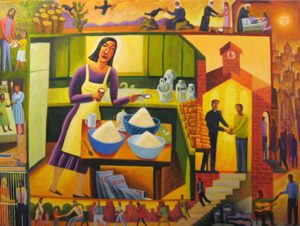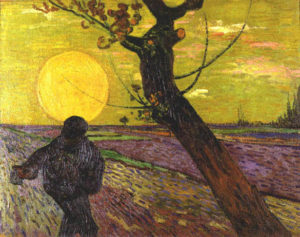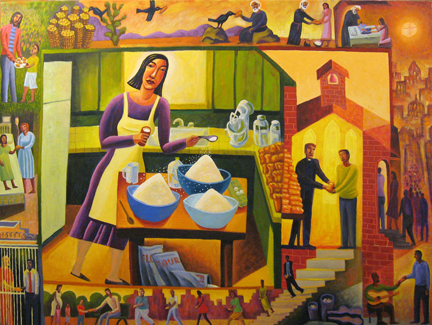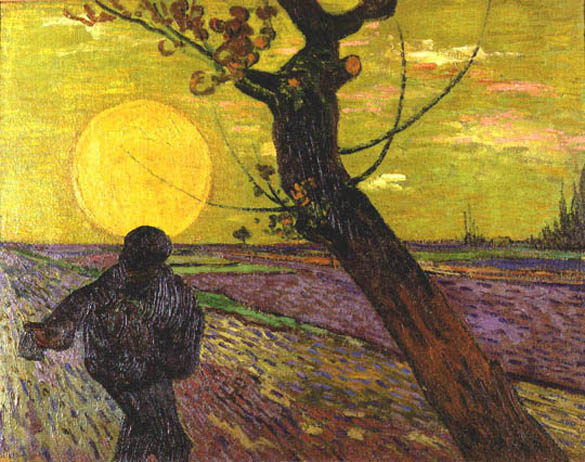Meditations on Kingdom of God: pearls, yeast, abundant nets, hidden treasure

Small and precious things found in sacred stories,
with the power to grow exponentially:
yeast, fish, pearls, seeds, and other treasures in the kingdom of God.
Meditations on Kingdom of God
God is the Possessor of the Kingdom: whoever lays his head before Him, to him he gives a hundred kingdoms without the terrestrial world; but the inward savour of a single prostration before God will be more sweet to you than a hundred empires: then you will cry in humble entreaty, “I desire not kingdoms: commit unto me the kingdom of that prostration.— Rumi
You’re just left with yourself all the time, whatever you do anyway. You’ve got to get down to your own God in your own temple. It’s all down to you, mate. — John Lennon
Meditations on Pearls
After all,” Anne had said to Marilla once, “I believe the nicest and sweetest days are not those on which anything very splendid or wonderful or exciting happens but just those that bring simple little pleasures, following one another softly, like pearls slipping off a string.” ― L.M. Montgomery, Anne of Avonlea
All art is autobiographical. The pearl is the oyster’s autobiography. — Federico Fellini
Full fathom five thy father lies; Of his bones are coral made; Those are pearls that were his eyes: Nothing of him that doth fade, But doth suffer a sea-change Into something rich and strange. — Shakespeare
At the edge of madness you howl diamonds and pearls. — Aberjhani, Journey through the Power of the Rainbow: Quotations from a Life Made Out of Poetry
Meditations on Fish
The act of fishing – for fish, dreams or whatever magic is available – is enough. ― Fennel Hudson, Traditional Angling – Fennel’s Journal – No. 6
Teach all men to fish, but first teach all men to be fair. Take less, give more. Give more of yourself, take less from the world. Nobody owes you anything, you owe the world everything. ― Suzy Kassem, Rise Up and Salute the Sun
The trout is still with me, as are my memories. The future is somewhere between these two forces, but it lives in mystery. The river records to trail behind or before me, and covers everything as it flows. This mountain and this river are old … ― Daniel J. Rice, The Unpeopled Season
“He can’t have gone,” he said “Christ know he can’t have gone. He’s making a turn. Maybe he has been hooked before and he remembers something of it.” Then he felt the gentle touch on the line and he was happy.”
― Ernest Hemingway, The Old Man and the Sea
Meditations on Yeast
All men cannot go to college, but some men must; every isolated group or nation must have its yeast, must have, for the talented few, centers of training where men are not so mystified and befuddled by the hard and necessary toil of earning a living as to have no aims higher than their bellies and no God greater than Gold. — W.E. B. DuBois
Enthusiasm is the yeast that makes your hopes shine to the stars. Enthusiasm is the sparkle in your eyes, the swing in your gait. The grip of your hand, the irresistible surge of will and energy to execute your ideas. — Henry Ford
You can’t just leave out one part; the bread won’t rise if the yeast isn’t there. — Holly Near
I Ask My Grandmother If We Can Make Lahmajoun
— Gregory Djanikian
Sure, she says, why not,
we buy the ground lamb from the market
we buy parsley, fresh tomatoes, garlic
we cut, press, dice, mix
make the yeasty dough
the night before, kneading it
until our knuckles feel the hardness
of river beds or rocks in the desert
we tell Tante Lola to come
with her rolling pins we tell
Zaven and Maroush, Hagop and Arpiné
to bring their baking sheets
we sprinkle the flour on the kitchen table
and it is snowing on Ararat
we sprinkle the flour and the memory
of winter is in our eyes
we roll the dough out
into small circles
pale moons over
every empty village
Kevork is standing on a chair
and singing
O my Armenian girl
my spirit longs to be nearer
Nevrig is warming the oven
and a dry desert breeze
is skimming over the rooftops
toward the sea
we are spreading the lahma
on the ajoun with our fingers
whispering into it the histories
of those who have none
we are baking them
under the heat of the sun
the dough crispening
so thin and delicate
you would swear
it is valuable parchment
we are taking out
and rolling up in our hands
and eating and tasting again
everything that has already
been written
into the body.
Meditations on themes from the Parable of the Sower & the Seed
Reflections on hard earth and fertile ground: sowing seeds, putting down roots, growing shoots … putting parables to work in current times.

The Sower by VanGogh
A Short Story of Falling — Alice Oswald
It is the story of the falling rain
to turn into a leaf and fall again
it is the secret of a summer shower
to steal the light and hide it in a flower
and every flower a tiny tributary
that from the ground flows green and momentary
is one of water’s wishes and this tale
hangs in a seed-head smaller than my thumbnail
if only I a passerby could pass
as clear as water through a plume of grass
to find the sunlight hidden at the tip
turning to seed a kind of lifting rain drip
then I might know like water how to balance
the weight of hope against the light of patience
water which is so raw so earthy-strong
and lurks in cast-iron tanks and leaks along
drawn under gravity towards my tongue
to cool and fill the pipe-work of this song
which is the story of the falling rain
that rises to the light and falls again
On Parables & Seeds
Not every end is the goal. The end of a melody is not its goal, and yet if a melody has not reached its end, it has not reached its goal. A parable. — Frederick Nietzsche
To paraphrase Muggeridge: Everything is a parable that God is speaking to us, the art of life is to get the message. ― Chester Elijah Branch
Each day of my life I am sowing seeds that one day I will harvest. — Gautama Buddha
Don’t judge each day by the harvest you reap but by the seeds that you plant. — Robert Louis Stevenson
A lower power cannot compass the full understanding of a higher. But to limit one’s belief to the bounds of one’s own small powers, would be to tie oneself down to the foot of a tree, and deny the existence of its upper branches. ― Mrs. Alfred Gatty, ie, Margaret Scott
Every problem has in it the seeds of its own solution. — Norman Vincent Peale
If you can look into the seeds of time, and say which grain will grow and which will not, speak then unto me. — William Shakespeare
Being an American is a state of mind, and to be in a family is to feel the power of belonging, the power of your roots. Family is a tree, the strength of a tree, the roots, the leaves, the past, the present, the future, the fruits, the seeds. — Esai Morales
He [Jesus] speaks in parables, and though we have approached these parables reverentially all these many years and have heard them expounded as grave and reverent vehicles of holy truth, I suspect that many if not all of them were originally not grave at all but were antic, comic, often more than just a little shocking. ― Frederick Buechner, Telling the Truth: The Gospel as Tragedy, Comedy, and Fairy Tale
Throughout the parables the paradoxical teachings continue: Give to receive. Die to live. Lose to win. ― Amos Smith, Healing the Divide: Recovering Christianity’s Mystic Roots
Maybe that’s why Jesus was so fond of parables: Nothing describes the indescribable like a good yarn. ― Cathleen Falsani, Sin Boldly: A Field Guide for Grace
A journey or pilgrimage also follows the parabolic curve of an arch: it swings out from a known point and returns symmetrically to a point on the same line or plane, but farther along. For this reason, ancient philosophers chose the arch as a symbol for the process of interpretation. That is why teaching stories, such as those of Jesus or Buddha, are known as parables. ― John Tallmadge, The Cincinnati Arch: Learning from Nature in the City
A Parable — Arthur Conan Doyle
The cheese-mites asked how the cheese got there,
And warmly debated the matter;
The Orthodox said that it came from the air,
And the Heretics said from the platter.
They argued it long and they argued it strong,
And I hear they are arguing now;
But of all the choice spirits who lived in the cheese,
Not one of them thought of a cow.
Parable of the Hostages — Louise Glück
The Greeks are sitting on the beach
wondering what to do when the war ends. No one
wants to go home, back
to that bony island; everyone wants a little more
of what there is in Troy, more
life on the edge, that sense of every day as being
packed with surprises. But how to explain this
to the ones at home to whom
fighting a war is a plausible
excuse for absence, whereas
exploring one’s capacity for diversion
is not. Well, this can be faced
later; these
are men of action, ready to leave
insight to the women and children.
Thinking things over in the hot sun, pleased
by a new strength in their forearms, which seem
more golden than they did at home, some
begin to miss their families a little,
to miss their wives, to want to see
if the war has aged them. And a few grow
slightly uneasy: what if war
is just a male version of dressing up,
a game devised to avoid
profound spiritual questions? Ah,
but it wasn’t only the war. The world had begun
calling them, an opera beginning with the war’s
loud chords and ending with the floating aria of the sirens.
There on the beach, discussing the various
timetables for getting home, no one believed
it could take ten years to get back to Ithaca;
no one foresaw that decade of insoluble dilemmas—oh unanswerable
affliction of the human heart: how to divide
the world’s beauty into acceptable
and unacceptable loves! On the shores of Troy,
how could the Greeks know
they were hostages already: who once
delays the journey is
already enthralled; how could they know
that of their small number
some would be held forever by the dreams of pleasure,
some by sleep, some by music?

